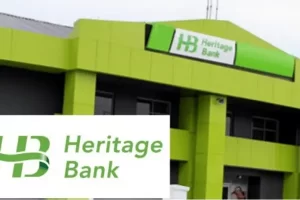Table of Contents
How Societe Generale Bank of Nigeria (SGBN) recommenced operation but now as Heritage Bank.


The story of Societe Generale Bank of Nigeria (SGBN) is one of resilience and transformation.

Join our Telegram Channel for Updates
Originally founded by the late Dr. Olusola Saraki, SGBN was a prominent bank in Nigeria with over 140 branches across major cities.
However, the bank faced significant challenges and eventually had its license revoked by the Central Bank of Nigeria (CBN) in 2006. This revocation was due to SGBN’s inability to meet the CBN’s recapitalization requirements set in 2004, which mandated a minimum capital of N25 billion by the end of 2006.
Despite the setback, the bank’s owners challenged the revocation in court. In June 2008, Justice Binta Murtala Nyako ruled that the CBN’s decision was unconstitutional and in bad faith.
This ruling opened the door for the bank’s re-emergence. In 2012, a letter from the CBN confirmed that the restructured bank, now known as Heritage Bank, had met the statutory capital base required for regional banking.
Heritage Bank officially recommenced operations on January 29, 2013, with Ifie Sekibo, a trained accountant and member of the Chartered Institute of Bankers and Institute of Petroleum, London, at the helm as the Managing Director.
The bank’s new ownership structure included International Energy Insurance (IEI) holding a major stake, Heritage Investment Services Limited owning 80%, priority shareholders 9%, and other minority shareholders 11%. The Saraki family retained a 10% shareholding but without principal control.
Heritage Bank quickly worked to validate the account statements of former SGBN customers and returned 100% of their funds. By December 2015, the bank had a total asset valuation of over $1.7 billion (N483.4 billion) and shareholders’ equity worth at least $88 million (N25 billion).
Heritage Bank expanded its footprint by acquiring Enterprise Bank Ltd. from the Asset Management Corporation of Nigeria (AMCON) in 2014, adding to its network of branches and ATMs across the country.
However, despite these efforts, Heritage Bank faced severe financial challenges. The CBN’s Revocation Order dated June 3, 2023, cited multiple violations, including insufficient assets to meet liabilities, unsound business conduct, failure to comply with statutory obligations, critical undercapitalization, and posing a threat to financial stability.
The bank’s net interest income was negative, primarily due to a high ratio of non-performing loans (NPL) at 81.2%, leading to significant losses and negative shareholders’ funds.
Notable individuals associated with Heritage Bank included Jani Ibrahim, an experienced professional in the aviation and oil and gas industries, who served as Chairman.
Akin George-Taylor, with over two decades in banking, served as Managing Director/CEO. Other key figures included Olayemisi Disu, Osepiribo Ben-Willie, Adewunmi Ogunsanya, and George Oko-Oboh, all of whom brought extensive experience in various sectors to the bank’s leadership team.
Despite the best efforts of its management and significant support from various stakeholders, Heritage Bank ultimately could not overcome its financial difficulties, leading to its liquidation.
The story of Heritage Bank highlights the challenges and complexities of the banking industry in Nigeria, illustrating the fine balance between regulation, management, and market conditions.









